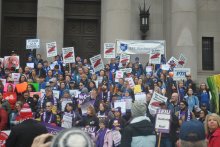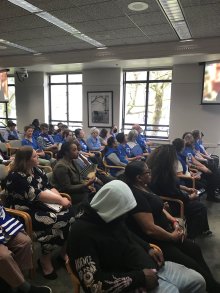
No Time Like The Present: Where We Stand After The Legislative Session
By AFT Washington Staff

Over the course of the 2025 legislative session, our priorities were clear – invest in the education workforce! We sought significant investment in classified staff, professional staff, and contingent faculty compensation and a permanent COLA for TRS/PERS 1 retirees, as well as investments in our students like eliminating the cap on special education funding and funding free meals for PreK-12 students.
In support of these priorities, members sent emails, signed on to letter campaigns, rallied, met with legislators, attended hearings both virtually and in person, and attended several lobby days – our presence in Olympia was visible, and it had an impact. We, along with sibling unions like WEA and WFSE, and in coalition with many other organizations, urged legislators to make bold steps to improve Washington state’s revenue situation by passing progressive revenue. The best part is that legislators heard us loud and clear! The first budget they proposed made a strong start to shifting financial responsibility for the state’s budget off the backs of working Washingtonians.
Unfortunately, that budget was rejected by the governor, who urged a much more modest revenue package. In light of uncertainty around the potential for legal challenges, federal budget cuts and challenges, and national economic volatility, legislators passed – and Governor Ferguson signed – a second budget that still had historic increases in revenue.
A summary of the new revenue in the budget bills:
- An additional 2.9% capital gains tax on gains over $1 million, making the rate 9.9%.
- Increasing the WEIA cap to $75 million and increasing the surcharge rate on the companies that pay it.
- Increasing B&O tax to manufacturing, retailing, wholesaling, and certain service activities, and establishing an additional surcharge on large financial institutions.
- Increasing the estate tax exemption threshold to $3 million but also increasing the marginal rate for large estates as high as 35% to overall increase revenue.
- Establishing an excise tax on nicotine products not previously covered.
- Closure of a number of outdated tax loopholes and tax preferences.
It’s also worth noting that the Senate passed their version of the Financial Intangibles Tax (FIT), also called the wealth tax, which was one of the most hotly-contested pieces of the first proposed revenue package. The vote was symbolic, as the FIT did not make it into the final budget agreed to by both chambers, but the meaning is clear: we have been bombarding legislators with support for progressive revenue, and they’ve heard us.
The budget that passed also carried with it cuts in funding that are still playing out and which left many people with “it could have been worse” as the summary of the 2025 legislative session. While true, that phrase does not fill us with victory, and that is to some extent misleading: we had several significant victories. The CTCs took a .5% funding cut, while the four years took a 1.5% cut, but the legislature declined to claw back the $28 million overpayment to the CTCs, which will help offset spending cuts, and retained funding for the Labor Education and Research Center and the Labor Archives.
In PreK-12, the big win is the elimination of the 16% cap on funding for students for special needs and the allocation of over $300 million more per biennium for special needs students. Materials, Supplies, and Operating Costs (MSOC) funding is increased by over $80 million per biennium. An interesting improvement in school meal funding means that the legislature allocated funding for meals not reimbursed by the federal government, and unused funds in this allocation can be put to summer meal programs.

All of this has material impact on us and our communities, but do not lose sight of the fact that maybe our most significant victory was how quickly we got the Legislature to accept that we need to change who Washington collects revenue from. That happened at light speed on the scale of legislative shifts – in 2021, we were in 50th place, nationwide, in how unbalanced our tax code was. In 2023, the Working Families Tax Credit moved us to 49th. Now, here we are in 2025, and the budget that just passed makes a strong start at requiring the wealthy to pay their share. That’s monumental change, and you made it happen.
Beyond the budget, the legislature also passed some excellent policy bills. The gun safety bill E2SHB 1163 passed, requiring a person purchasing a gun to obtain a permit to purchase, and requiring a safety training course be completed to get that permit, among other improvements to gun safety. Unemployment for striking workers also passed the legislature, with 6 weeks of unemployment insurance in the final bill sent to the governor's desk. Another big win is the rent stabilization bill, which limits yearly rent increases at 7% plus inflation or 10%, whichever is less. The goal is to help Washington renters, who make up 40% of the state's residents, including many of our members, our students, and their families, to have some predictability and control over their budgets.
While this budget is not where we wanted it to be, this was still a session with historic revenue improvements that move Washington closer to a fair tax code by asking the largest and most profitable businesses in our very profitable state to do more to support our shared future. That’s a message that members really delivered to legislators, and it’s a message we can build on in the next sessions as we seek more policy and financial improvements. It is not overstating the case to say that member turnout made a big difference in this session, and we can grab that momentum and keep going right into 2026 and 2027! Your advocacy matters: without it, we would be looking at billions in devastating cuts. With it, we can build the future that we need.
Looking Forward To 2026
By AFT Washington Staff

We have already begun to develop our legislative strategies and priorities for the 2026 legislative session. That session is a short, non-budget session, so there will be limited opportunity for wage improvements or other significant investments, but that means it’s a great time to advance policy proposals.
We have met with several coalitions and sibling unions to identify priorities we want to support and how our members can best advance them, and are in the earliest stages of preparing our legislative agenda, in conjunction with the Legislative Affairs Committee and our constituency councils, and committees. Our plan is to prefile bills by Thanksgiving and be in close contact with key legislators all the way through to the start of session in January. We’ll have opportunities for members to let their legislators know what matters to us and we will be reaching out so you can take part.
Washington’s June 23rd revenue forecast is overall cautious, noting some revenue growth, but should be considered in light of national issues, including slowing economic growth, the uncertainty around tariffs, the potential for trade disruptions due to international conflict, and the possibility of federal spending cuts, resulting in gaps the state will need to close. A large part of our strategy for next year will be defending against harmful bills and takeaways, pursuing non-economic policy wins, and setting the stage for advancing our priorities around pay equity, general wage and salary increases, COLA funding, and other needs in 2027. Stay tuned – we’ll definitely invite you to get involved!
The Primary Election Is Approaching!
By Cortney Marabetta, Communications Specialist
It’s nearly time for the 2025 primary, and we already have quite a few candidates we’ve endorsed! Several of our locals have been active in city- and county-level races, endorsing the candidates they believe will best represent our members’ interests. We also have some legislative endorsements in process, due in part to the unusually high number of legislature appointees who are finishing their predecessor’s incomplete term.
Our endorsement process provides the opportunity to inform candidates on the issues that matter to our members. It creates a doorway to influencing them when they are in office and helps us hold them accountable to the principles and values we share. We have several hundred members who contribute to our COPE fund so that we can contribute to candidates we want to see in office. If you would like to learn more about our endorsement process, or want to understand best practices for establishing an endorsement process at your own local. please reach out to Richard Burton at rburton@aftwa.org.
For more information on our endorsed candidates and all things legislative, subscribe to the Legisletter! We’ll begin publishing electoral updates in mid-July. The primary electoral period starts on July 18th, when ballots are mailed, and the election is August 5th.
